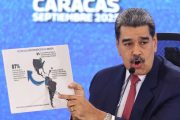Barack Obama has finally spoken up about the U.S. pastor imprisoned for his faith in Iran’s notorious Evin prison. Fox News reported that during a phone call late last week between President Obama and Iranian President Hassan Rouhani, Obama raised the issue of Saeed Abedini, the Iranian-American pastor from Idaho who has now been imprisoned in his native country for one year. The president allegedly expressed his concern over the wellbeing of Abedini, as well as two other U.S. citizens in the hostile country.
A White House official was quoted by Fox as saying that Obama duly registered his concern with Rouhani “about three American citizens who have been held within Iran: Robert Levinson [who is missing], Saeed Abedini, and Amir Hekmati, and noted our interest in seeing those Americans reunited with their families.”
Abedini’s wife, Naghmeh, who days before the high-level dialogue encountered President Rouhani in a New York hotel lobby and presented him with a letter from her husband, called the latest development “the most encouraging news I have heard since Saeed was imprisoned one year ago. I am very grateful to President Obama for standing up for Saeed and for the other Americans who are held captive in Iran. This development is truly an answer to prayer.”
While Secretary of State John Kerry made a belated appeal for the release of the three men several weeks ago, this is the first time that Obama has even publicly acknowledged Pastor Abedini’s plight, although the pastor’s apprehension, mock trial, and eight-year sentence by an Islamic court received substantial coverage in the American press.
Jordan Sekulow of the American Center for Law and Justice (ACLJ), which has been representing Abedini’s wife and their two children, called Obama’s actions “a significant step forward in this critical case. We’re grateful to President Obama for raising Saeed’s imprisonment and call on President Rouhani to put his promise of being ‘moderate’ into action by releasing Saeed without further delay.”
Sekulow said that the imprisoned Abedini found out from his family in Iran about Obama’s phone call with the Iranian president. “Early Monday morning [September 30] in Tehran, Pastor Saeed’s Iranian family was able to sit and visit with him — through a glass partition — during regular visitation hours at Evin Prison,” recalled Sekulow. “For the first time, Pastor Saeed had a glimmer of hope that he would soon be released. Iranian news sources had reported on President Obama’s phone call with President Rouhani.”
Sekulow emphasized that Abedini, “a U.S. citizen, has done nothing wrong and is imprisoned simply because of his Christian faith. If President Rouhani wants to start a new relationship with the United States, releasing this American pastor, husband, and father now would send an important message to the world.”
In March Naghmeh spoke before the U.S. Congress’ Tom Lantos Human Rights Commission, expressing her disappointment in the Obama administration’s apparent lack of interest in her husband’s case. She said that while “not all Americans are Christians,” all Americans want the assurance that their government will come to their aid when being held hostage by a foreign power. “I expect more from our government,” Naghmeh told the commission. “We should know that as American citizens, our government will stand up for us. I have been told that I have not requested the assistance of the State Department. That is not the case. I have pleaded many times for their help to free my husband. I continue to ask our government to bring my husband, my children’s father, back home.”
In August, when a religious court in Iran refused an appeal of Abedini’s eight-year prison sentence, Naghmeh once again targeted the Obama administration, saying that she was “disappointed that as a country founded on religious freedom, our government has been awkwardly silent as an American citizen is wasting away in an Iranian prison because he chose to practice his God-given right to choose his religion.”
Naghmeh’s message apparently got through, first to Secretary of State Kerry, who in early September issued a statement saying: “The United States respectfully asks the Government of the Islamic Republic of Iran to work cooperatively with us in our efforts to help U.S. citizens Robert Levinson, Amir Hekmati, and Saeed Abedini to return to their families after lengthy detentions.”
Less than a month later Obama himself appeared to have been prodded into action by Naghmeh Abedini’s chance encounter with Rouhani, during which she presented the Iranian president with a letter addressed personally to him from her husband. In the letter Abedini noted that his frequent trips to Iran before he was detained were for humanitarian reasons. “Mr. President, I, like you, believe in moderation and, as a spiritual man, have no interest in politics and did not seek actions against national security, propaganda or political groups,” Abedini wrote. “My purpose in all my attempts in my hometown was to reduce pain and suffering as well as compassion for the poor, orphans and unaccompanied children in accordance with religious rules and the sole intention of pleasing my Savior, Jesus Christ.”
The U.S. pastor concluded his letter with the appeal: “Please take immediate action in this regard…. Considering the fact that I came to Iran to serve the orphans, please do not let them make my children orphans and my wife without a guardian.”
In her own statement following the news of President Obama’s appeal, Naghmeh Abedini said: “I urge President Rouhani, as I have done throughout this week, to release Saeed so he can return to our home and our family in the United States. In recent days, Iran has released 80 prisoners being held because of their beliefs. I pray that we can add Saeed to that list very soon.”
Photo of President Barack Obama: AP Images




